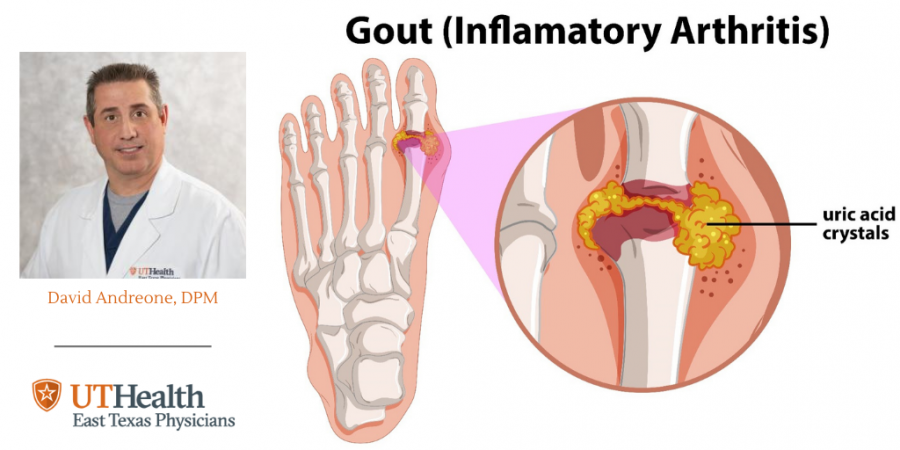
As we quickly approach the holiday season, I hope that many of my patients will be experiencing much-needed relaxation and quality time with friends and family. However, they may also celebrate with some little overindulgences in fine food and alcohol, which could lead to another unwelcomed holiday gift. This is the time of year I often get phone calls from patients experiencing pain, redness and swelling in their toes or foot with no memory of how it could have happened. If you have ever experienced this, you may have been the unexpected recipient of a gout attack.
Certain foods like venison, organ meats, greens, some fish, beer and liquor are rich in purines that contain uric acid, and when consumed in excess, can cause a painful gout attack. Other foods high in purines include those containing yeast such as bread and wine and should be limited in the diet. Also, some medications like diuretic medications that cause dehydration can lead to gout and even stress or recent surgery can also be a common trigger.
Here’s the science behind it.
When we ingest foods containing purines, our bodies try to break them down and get rid of them usually through urination. However, some of us overproduce uric acid or do not eliminate enough of it when we urinate. So, when our blood is rich in uric acid it usually remains a liquid while it is in our body core, which is not a problem. However, our legs and arms are cooler than our core body temperature and something strange happens to the purine-rich blood when it cools. It actually forms crystals. So, when our blood is heading out toward our extremities, gravity usually pulls the crystals down into our legs. And in the case of gout, the most common area affected is the great toe joint. It can also affect the lesser toes, top of the foot, the ankle and the knee. These crystals are very irritating and can cause a lot of pain and swelling. Some of my patients tell me that they can’t stand for anything to touch their foot, not even the sheets.
So now that we know what gout is, what can you do about it?
First of all, you will want to see a foot specialist as soon as possible, a podiatrist, who has lots of experience specializing in foot maladies. Your doctor will want to make sure that what you're having is in fact a gout attack and not something else like an infection. So, they will likely do some blood work to determine the cause and take x-rays to rule out trauma. Next, I usually prescribe colchicine to help my patients get rid of the crystals and possibly a non-steroidal anti-inflammatory medication or an oral steroid to help lessen the inflammation and pain.
Also, be sure to discuss with your doctor the medications, foods and drinks you had prior to the pain and redness occurring to try to determine what the triggering event was. Rest is important and elevating your foot may also help relieve the symptoms. It will be important to drink more water. I also encourage my patients who have repeated gout episodes despite changes to their diet and medications to have their kidneys checked out more closely.
Dr. David Andreone is a board-certified clinical and surgical foot specialist in podiatry at UT Health East Texas in Tyler, Texas. To make an appointment, call 903-877-5658.

